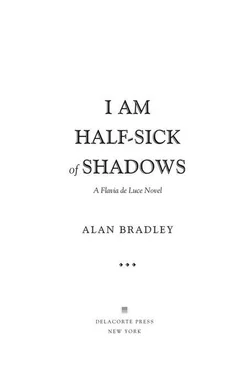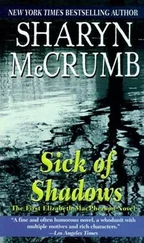Alan Bradley - I Am Half-Sick of Shadows
Здесь есть возможность читать онлайн «Alan Bradley - I Am Half-Sick of Shadows» весь текст электронной книги совершенно бесплатно (целиком полную версию без сокращений). В некоторых случаях можно слушать аудио, скачать через торрент в формате fb2 и присутствует краткое содержание. Жанр: Старинная литература, на английском языке. Описание произведения, (предисловие) а так же отзывы посетителей доступны на портале библиотеки ЛибКат.
- Название:I Am Half-Sick of Shadows
- Автор:
- Жанр:
- Год:неизвестен
- ISBN:нет данных
- Рейтинг книги:5 / 5. Голосов: 1
-
Избранное:Добавить в избранное
- Отзывы:
-
Ваша оценка:
- 100
- 1
- 2
- 3
- 4
- 5
I Am Half-Sick of Shadows: краткое содержание, описание и аннотация
Предлагаем к чтению аннотацию, описание, краткое содержание или предисловие (зависит от того, что написал сам автор книги «I Am Half-Sick of Shadows»). Если вы не нашли необходимую информацию о книге — напишите в комментариях, мы постараемся отыскать её.
I Am Half-Sick of Shadows — читать онлайн бесплатно полную книгу (весь текст) целиком
Ниже представлен текст книги, разбитый по страницам. Система сохранения места последней прочитанной страницы, позволяет с удобством читать онлайн бесплатно книгу «I Am Half-Sick of Shadows», без необходимости каждый раз заново искать на чём Вы остановились. Поставьте закладку, и сможете в любой момент перейти на страницу, на которой закончили чтение.
Интервал:
Закладка:
—The Boston Globe
“An elegant mystery.”
—The Plain Dealer

I Am Half-Sick of Shadows is a work of fiction. Names, characters, places, and incidents either are the product of the author’s imagination or are used fictitiously. Any resemblance to actual persons, living or dead, events, or locales is entirely coincidental.
Copyright © 2011 by Alan Bradley
All rights reserved.
Published in the United States by Delacorte Press, an imprint of The Random House Publishing Group, a division of Random House, Inc., New York.
DELACORTE PRESS is a registered trademark of Random House, Inc., and the colophon is a trademark of Random House, Inc.
Library of Congress Cataloging-in-Publication Data
Bradley, C. Alan
I am half-sick of shadows: a Flavia de Luce novel / Alan Bradley.
p. cm.
eISBN: 978-0-345-53215-2
1. Girls—England—Fiction. 2. Murder—Investigation—Fiction.
3. Actresses—Crimes against—Fiction. 4. Motion pictures—
Production and direction—Fiction.
I. Title.
PR9199.4.B7324I15 2011
813′.6—dc22
2011022373
www.bantamdell.com
Case design: Joe Montgomery
Case art: Ben Perini
v3.1
… She hath no loyal knight and true,
The Lady of Shalott.
But in her web she still delights
To weave the mirrored magic sights,
For often through the silent nights
A funeral, with plumes and lights,
And music, went to Camelot;
Or, when the moon was overhead,
Came two young lovers lately wed.
“I am half-sick of shadows,” said
The Lady of Shalott.
ALFRED TENNYSON
“The Lady of Shalott”
Contents
Cover
Title Page
Copyright
Epigraph
Chapter One
Chapter Two
Chapter Three
Chapter Four
Chapter Five
Chapter Six
Chapter Seven
Chapter Eight
Chapter Nine
Chapter Ten
Chapter Eleven
Chapter Twelve
Chapter Thirteen
Chapter Fourteen
Chapter Fifteen
Chapter Sixteen
Chapter Seventeen
Chapter Eighteen
Chapter Nineteen
Chapter Twenty
Chapter Twenty-one
Chapter Twenty-two
Postlude
Dedication
Acknowledgments
Other Books by This Author
About the Author
• ONE •
TENDRILS OF RAW FOG floated up from the ice like agonized spirits departing their bodies. The cold air was a hazy, writhing mist.
Up and down the long gallery I flew, the silver blades of my skates making the sad scraping sound of a butcher’s knife being sharpened energetically on stone. Beneath the icy surface, the intricately patterned parquet of the hardwood floor was still clearly visible—even though its colors were somewhat dulled by diffraction.
Overhead, the twelve dozen candles I had pinched from the butler’s pantry and stuffed into the ancient chandeliers flickered madly in the wind of my swift passage. Round and round the room I went—round and round and up and down. I drew in great lungfuls of the biting air, blowing it out again in little silver trumpets of condensation.
When at last I came skidding to a stop, chips of ice flew up in a breaking wave of tiny colored diamonds.
It had been easy enough to flood the portrait gallery: An India-rubber garden hose snaked in through an open window from the terrace and left running all night had done the trick—that, and the bitter cold which, for the past fortnight, had held the countryside in its freezing grip.
Since nobody ever came to the unheated east wing of Buckshaw anyway, no one would notice my improvised skating rink—not, at least, until springtime, when it melted. No one, perhaps, but my oil-painted ancestors, row upon row of them, who were at this moment glaring sourly down at me from their heavy frames in icy disapproval of what I had done.
I blew them a loud, echoing raspberry tart and pushed off again into the chill mist, now doubled over at the waist like a speed skater, my right arm digging at the air, my pigtails flying, my left hand tucked behind my back as casually as if I were out for a Sunday stroll in the country.
How lovely it would be , I thought, if some fashionable photographer such as Cecil Beaton should happen by with his camera to immortalize the moment .
“Carry on just as you were, dear girl,” he would say. “Pretend I’m not here.” And I would fly again like the wind round the vastness of the ancient paneled portrait gallery, my passage frozen now and again by the pop of a discreet flashbulb.
Then, in a week or two, there I would be, in the pages of Country Life or The Illustrated London News , caught in mid-stride—frozen forever in a determined and forward-looking slouch.
“Dazzling … delightful … de Luce,” the caption would read. “Eleven-year-old skater is poetry in motion.”
“Good lord!” Father would exclaim. “It’s Flavia!
“Ophelia! Daphne!” he would call, flapping the page in the air like a paper flag, then glancing at it again, just to be sure. “Come quickly. It’s Flavia—your sister.”
At the thought of my sisters I let out a groan. Until then I hadn’t much been bothered by the cold, but now it gripped me with the sudden force of an Atlantic gale: the bitter, biting, paralyzing cold of a winter convoy—the cold of the grave.
I shivered from shoulders to toes and opened my eyes.
The hands of my brass alarm clock stood at a quarter past six.
Swinging my legs out of bed, I fished for my slippers with my toes, then, bundling myself in my bedding—sheets, quilt, and all—heaved out of bed and, hunched over like a corpulent cockroach, waddled towards the windows.
It was still dark outside, of course. At this time of year the sun wouldn’t be up for another two hours.
The bedrooms at Buckshaw were as vast as parade squares—cold, drafty spaces with distant walls and shadowy perimeters, and of them all, mine, in the far south corner of the east wing, was the most distant and the most desolate.
Because of a long and rancorous dispute between two of my ancestors, Antony and William de Luce, about the sportsmanship of certain military tactics during the Crimean War, they had divided Buckshaw into two camps by means of a black line painted across the middle of the foyer: a line which each of them had forbidden the other to cross. And so, for various reasons—some quite boring, others downright bizarre—at the time when other parts of the house were being renovated during the reign of King George V, the east wing had been left largely unheated and wholly abandoned.
The superb chemical laboratory built by his father for my great-uncle Tarquin, or “Tar,” de Luce had stood forgotten and neglected until I had discovered its treasures and made it my own. With the help of Uncle Tar’s meticulously detailed notebooks and a savage passion for chemistry that must have been born in my blood, I had managed to become quite good at rearranging what I liked to think of as the building blocks of the universe.
“Quite good?” a part of me is saying. “Merely ‘quite good’? Come off it, Flavia, old chum! You’re a bloody marvel, and you know it!”
Most chemists, whether they admit it or not, have a favorite corner of their craft in which they are forever tinkering, and mine is poisons.
While I could still become quite excited by recalling how I had dyed my sister Feely’s knickers a distinctive Malay yellow by boiling them in a solution of lead acetate, followed by a jolly good stewing in a solution of potassium chromate, what really made my heart leap up with joy was my ability to produce a makeshift but handy poison by scraping the vivid green verdigris from the copper float-ball of one of Buckshaw’s Victorian toilet tanks.
Читать дальшеИнтервал:
Закладка:
Похожие книги на «I Am Half-Sick of Shadows»
Представляем Вашему вниманию похожие книги на «I Am Half-Sick of Shadows» списком для выбора. Мы отобрали схожую по названию и смыслу литературу в надежде предоставить читателям больше вариантов отыскать новые, интересные, ещё непрочитанные произведения.
Обсуждение, отзывы о книге «I Am Half-Sick of Shadows» и просто собственные мнения читателей. Оставьте ваши комментарии, напишите, что Вы думаете о произведении, его смысле или главных героях. Укажите что конкретно понравилось, а что нет, и почему Вы так считаете.











